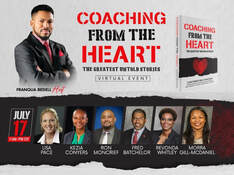 Imagine climbing to the top of a mountain. Standing at the top, inhaling, exhaling the beautiful fresh air. Being at peace and admiring the view. You know, having a moment enjoying nature. Then suddenly, someone walks up behind you and pushes off the mountain. Now you are wailing in air, trying to figure out what happened, furthermore how can I level out into a glide with the wind beneath my wings to land safely. The past few years have been filled with several learning lessons. A lot of self-reflection and self-assessing. There were times where I questioned myself as a coach. I thought to myself, “why am I here?” Can I really do this? Do this meaning, re-construct a women’s basketball program that's in disarray. How can I cultivate the image of this program? What’s the best way I can serve the young women on the team now and in the future? I thought about this quote I once heard. “We didn’t come this far, just to come this far” There’s no way I’ve gotten to this point to not succeed. To not continue to figure things out accordingly. I understand that every level will garner another level of commitment, focus, and eagerness to learn from myself. I’m embracing each moment and leaning into the different situations that come my way. How can I tell players to embrace challenges and find a way to accomplish goals, If I don’t do it myself? Being a part of this co-authoring project was refreshing. Everyone shared their unique experiences in coaching. I was able to take away little nuggets of knowledge from each person, reassuring to practice patience, remembering everything is a process. Each coach has encountered a multitude of lessons, transcending their thinking which has enable them to enhance their teachings to prepare the next generation for life. This moment in time I’m receiving everything I need to learn in order I’ve been stretched, having to adapt quickly in order to establish a foundation for my program. Personally, and professionally here is what I’ve learned…………….
A few snippets from Coaching from the heart: The Greatest Untold Stories Knowing God’s purpose for creating you will reduce your stress, focus your energy, simplify your decisions, give meaning to your life and most importantly prepare you for eternity. In my 30 plus years of coaching, I have often asked myself what is my purpose in this profession. It’s very easy after the wins where you are down by 20 points and come back to win to understand your purpose. I can remember losing a game after being up by 20 points. ~ Fred Batchelor Motherhood made me a better coach in all aspects. Raising my son has taught me I was his first coach, literally and figuratively. Teaching him in everyday life and then coaching his soccer team, I realized the influence I had with his thinking process. I learned sooner rather than later that I was the person who sees his strengths and weaknesses. I realized the wisdom that I pour into him right now will help him throughout his life. ~Morra Gill I have always felt like God gave me a gift to help others. At a very early stage I my coaching career, I realized that it wasn’t a job for me. It was more that, I was on a journey. Pat told me to not follow the money. If I did my job well the money would fine me. She also said to learn to do every task that was required of anyone and to not be afraid to do anything required or not. Learn it all. ~ Lisa Pace Hope you all enjoy reading, Coaching from the Heart: The Untold Stories. Order your copy today for only $20
0 Comments
6/24/2021 1 Comment Life starts once your eligibility is over, so it's important to be "More than an athlete"Malik Slater was named to the Tusculum University football coaching staff in the summer of 2020. He serves as defensive line coach and is responsible for the bandit position on the TU defense. Slater, a native of Tallahassee, Florida, played one season of professional football with the Cedar Rapids River Kings of the Indoor Football League. He played in seven games in the 2019 campaign where he averaged 6.6 tackles per game while finishing the year with 46 stops with 4.5 tackles for loss, 2.5 sacks, forced two fumbles and recorded an interception. Slater played two seasons at Jacksonville University before transferring to Valdosta State University for his final two years, all with head coach Kerwin Bell. Played in 21 games at Jacksonville (2014-2015) where he totaled 113 tackles, 7.5 tackles for loss and 2.5 sacks at linebacker as future Tusculum head coach Jerry Odom was his defensive coordinator at JU. Slater earned All-Pioneer Football League honorable mention recognition in 2015 with the Dolphins. He was a two-year starter at Valdosta State (2016-2017) where he garnered All-Gulf South Conference first team honors in 2017. He was also a D2CCA All-Super Region 2 first team selection and earned a berth to the FCS Senior Bowl where he was named the Defensive Most Valuable Player. He was also an invitee to the Tropical Bowl All-Star Game. Slater totaled 115 tackles in his 20 career games with the Blazers including seven tackles for loss. He earned his undergraduate degree from Valdosta State with a degree while majoring in business administration and marketing. He is working on his master’s degree from Tusculum in sports administration. 1.Tell us about your journey after playing football. Once I finished what I would consider my last season of playing professional football, I knew that I needed to finish up my undergraduate degree. It entailed of me having to move back to Valdosta and finish my degree on campus in two semesters. While I embarked on finishing my degree, I had to take on working two jobs and an internship, all while having to deal with the complications from COVID pretty much shutting everything down (except my two jobs and internship). Despite these circumstances, I was able to persevere through everything and graduate in May 2020 with my bachelor’s in Marketing. During that time period, my old coach had reached out to me with an opportunity as a graduate assistant football coach and in June 2020, I moved to Greeneville, Tennessee to become a graduate assistant as an assistant defensive line coach at Tusculum University. Even though COVID cancelled the fall season, we participated in a shortened Spring season in which we won the Southern Atlantic Conference championship for the first time in 13 years. Now I hold a full-time position coaching the defensive line. 2.Being that you transferred from Jacksonville University to Valdosta State University, relay to athletes now who are seeking to transfer the pros and cons in doing so. Transferring is a very big decision to make and should be carefully considered when doing so. Everybody’s situation is different, and it varies, but your main priority should be putting yourself in the best position to succeed and find somewhere that will allow you to flourish and grow on and off the field. Some of the pros include giving yourself a new start, in which you can learn and grow from your experience at your former school, creating new relationships and forming new connections, the potential for more playing time, and the opportunity to create new experiences and life-long memories. However, some of the cons include the potential for the transfer to not be the right fit, coaching staffs leaving and have to get accustomed to another change and losing credits for your degree. 2b. Also, what should athletes look for in the next college in order to make the right decision when transferring. The number one thing I would recommend athletes to look for is the best opportunity to call that new college home in which it will give you the best opportunity to succeed, flourish and grow on and off the field. Instead of chasing the biggest name, find somewhere that has a great culture, a players-first staff, and has a great program for your intended major that you plan on graduating in. 3.Who was Malik the football player, versus Malik the football coach? Malik the football player was someone who was determined to be the best in all phases and aspects of the game. Someone who brought a “lunch pail” mentality day in and day out. I wanted to lead by example 24/7 and hold myself accountable every day so I could be in position to hold others around me accountable. I also wanted to be able to elevate my teammates’ “game” around me through my actions and discipline in order to help them reach their full potential as well. Malik as the football coach embodies many of those same characteristics, but more so from a mentor standpoint. My mindset now is not only to develop players into reaching their full potential on the field, but off the field as well becoming successful young men. I know how pivotal those 4-5 years of growth are for young men, so to me it is imperative that I focus on off the field aspects just as much as on the field because the game doesn’t last forever. 4.Name one thing you incorporate into your coaching style (on/off the field) you wish your coaches would have done with you. I would say that career emphasis/financial literacy is something that I make sure that I incorporate that I wish my coaches would have done more of. Graduating with my degree in business gave me insight on entrepreneurship and starting businesses and that is something that I try to pass on to my players. The game doesn’t last forever, so its imperative for these young men to have an idea of what they want to do career wise once their finished up with their eligibility. 5.What advice would you give to your younger self? Control what you can control and trust God’s plan for you. Those were some of the biggest lessons that I was able to learn through experience and that someone passed on to me. Often times we find ourselves worrying about things that are out of our control, causing us to stress and create negative energy. If you focus on your attitude, effort, and putting out positive energy each and every day, then things will work themselves out and more than likely work out in your favor as well. 6.How important is it for athletes to develop an identity outside of sports? And why? To me that is one of the most important things that athletes should do. I was taught to never put all of your eggs into one basket, and when you do that with your prospective sport, you somewhat place yourself in a dilemma whether you realize it or not because the game doesn’t last forever. Life starts once that eligibility is up, and it is important to be “more than an athlete.” If you strive to become more of a well-rounded individual, then you give yourself a better chance to make that transition once your playing eligibility is up. 7.As we know, the transition period is more mental, what are some practices you did to not allow your thoughts to hinder how you moved forward after playing? The main things I did was reach out to my friends/family who made the transition from playing sports to finding out a different path in life. Being able to hear their experiences helped me tremendously in making that transition. Also having mentors in different fields such as business helped me as well, because it gave me a different potential path that I could travel down. 8.What has been most challenging to you transitioning to life after playing sports? The most challenging thing I dealt with while transitioning to life after playing sports was battling with the idea of not fulfilling my dream of playing in the NFL. Although I hadn’t put all of my eggs into that basket, it was something that I didn’t allow myself to believe that I wouldn’t do. To see other people, get the opportunity, especially the ones who I felt my skills were either on par with or exceeded theirs bothered me mentally, but it was something I ultimately charged to the game. I was able to find solace and comfort in the idea that I gave it everything I had towards that dream, and that I could still be close to the game while positively impacting young men’s lives, which has been fulfilling to me in its own right. 9.What should all athletes expect to experience once their playing career is over? Anger, frustration, disappointment, and uncertainty are all some of the emotions I experienced once my playing career was over and many may feel those. There can be a period of darkness as well, especially being mentally conditioned for your prospective sport for many years and then all of a sudden, it’s gone. Once those initial feelings were out of the way though I felt an appreciation of what my path and the game gave me. So many relationships/connections, experiences, and lessons that I learned along the way superseded those initial feelings and I wouldn’t trade them for anything in the world because it played a role in becoming the man I am today. 10.How can coaches and other personnel within an athletic department put systems in place to assist athletes with life skills and prepare them for life after sports? I believe there should be a designated department within the athletic department for all collegiate programs that solely focus on career path development. So many players get thrown into degree programs that are easier just to remain academically eligible, in which results in many of those players not graduating or having a degree in something they genuinely have no interest in and don’t end up pursuing a career in as well. Head coaches should be required to either hire somebody on staff who does this or designate a coach who performs this task as well, and it should be greatly encouraged throughout all coaching staffs because the job of a coach extends far beyond athletic performance/development. 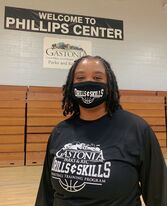 Born and raised in Gastonia, NC, Carleena Costner played basketball at Appalachian State University, earning her bachelor’s degree in Organizational Communication & received her Masters of Science in Sports Management from Georgia Southern University. While at Appalachian State, Carleena attained numerous academic accolades as a student athlete, including TIAA CREF Academic All-Conference honors, Phi Eta Sigma and National Society of Collegiate Scholars inductions. Costner was also an Appalachian State scholar ring recipient for the class of 2007, an award presented to Appalachian State student athletes that graduate with a cumulative GPA of 3.0 or higher. Currently, Carleena works for the City of Gastonia Parks and Recreation Department as the Director for Phillips Community Center and is the creator of Drills & Skills Academy, a basketball training program for ages 5-15 designed to cultivate the well-rounded student athlete. 1.What is Drills &Skills Academy and why is it so important to your community? Drills & Skills Academy is a basketball training program for ages 5-15 designed to cultivate the well-rounded student athlete. Here, athletic development is coupled with educational components to prepare athletes athletically & academically. DSA is important to my community because it provides athletes access to training at a low cost while preparing them for their academic and athletic future. 2.At this grassroot age, fundamentals and development are important. What drills do you start with depending their skill level? During the 6-week training, week 1 consists of an evaluation to see where each child is in their development stage. Weekly, lessons are then tailored to cover the basic fundamentals such as ball handling, shooting, defense & team IQ. As a child progresses in their training, drills become more complex and specific to their position. 3.How has the program evolved over the years? DSA’s initial focus was basketball training. In the past 2 years, DSA incorporated the “Academy” portion to the program. This aspect emphasizes enhancing academics, basketball IQ, and other life skills to explore all avenues essential to personal development. DSA has become a staple in the community, averaging roughly 60 athletes per 6-week sessions. 4.What perspective have you discovered that is common among parents regarding their child? Families that have been in our program since its inception are very patient and understanding with the training process and understand that each child develops differently. They are extremely supportive and are truly the backbone for the success of the program. 5.As a former Division I athlete, what advice can you give to athletes pursuing an opportunity in sports. You must be fully committed to your development as both a student and an athlete. Maintaining good grades, time management skills, communication skills and maintaining a positive attitude will be key to your success as an athlete at the elite level. 6. How has Drills & Skills Academy been beneficial to your community? Drills & Skills Academy is beneficial to my community because it provides a blue print of the steps necessary to become a successful student athlete. By providing the program at a low cost, it eliminates financial stressors and the inability for a child to receive elite training as compared to their peers in suburban areas. 7.What have you found to be gratifying the most working with kids in your program? The most gratifying part of working with kids in my program is seeing their growth and development as students and athletes. As they improve, you see a shift in their focus and mentality which will be essential to their careers as they transition to middle school & high school sports. 8.The educational component of Drills & Skills academy; speak about it The educational component of DSA encompasses various aspects outside of physical training to enhance development. In regards to the educational component of athletics, athletes are taught how to dissect game film, read X’s and O’s, create plays and taught how to read and develop scouting reports. Academically, athletes participate in academic enhancement activities, introduced to NCAA Clearinghouse requirements & will participate in virtual and on-campus college tours. To enhance life skills, athletes participate in financial literacy courses and are encouraged to explore avenues outside of sports. In a previous Academy session, athletes were tasked with identifying a talent outside of sports that could be used to create an entrepreneurial avenue. Our goal is to help athletes tap in to all talents to become well rounded young adults. 9.Did you ever think your experiences would be a vehicle to helping other athletes now? I wouldn’t have imagined that I would be here today working with athletes in this capacity. As a Division I athlete, there were areas I struggled in based on the lack of knowledge and resources that I had growing up. Once I returned to my hometown, I knew that it was essential to create a program like this to help athletes develop personally and athletically. 10.What are your future plans for Drills & Skills Academy? Do you plan on expanding in any way? In regards to expansion, I would love to work with other recreation departments to incorporate a form of DSA as a product in their communities. Oftentimes, athletes in at-risk communities aren’t afforded equal opportunities for training and development. In collaboration with parks and recreation departments, DSA athletes can access academic and athletic resources needed to better prepare them for their future. 11. How can all of us as former athletes lead and inspire in the right way for the athletes, we come in contact with to become successful? Be honest and transparent with your experiences as a Division I athlete. Share every aspect of your journey to help athletes understand the sacrifices and mental qualities needed to be successful not only as an athlete, but as a person. Follow Drills & Skills: Facebook @drillsandskillsbasketball IG @drillsandskillsbasketball ,A native of Durham, NC, Pierre played football at Appalachian State University where he earned his bachelor's degree in Electronic Media/Broadcasting and Master's of Arts in Educational Media. He was a member of three National Championship teams, a two-time All-American, and a three-time All-Southern Conference selection. Pierre is the Director of Student-athlete development. Currently, he also serves as a College Football Analyst on ESPN+, where he is the color commentator for Appalachian State Football. He is the co-host/producer of App State Sports weekly, the official podcast of Appalachian State Athletics. In addition to his sports media duties, he is the host of the Afternoon Rush on Classic Hits 100.7 & 99.1 FM WZJS and the host/CEO of Feel Good Radio.
1.Tell me about Pierre, the football player. Wasn’t the biggest, fastest or strongest. I used my intelligence to be effective on the football field. Studying film, scouting helped me to appear to be moving quickly. Intelligence and toughness were key. Also, being coachable, and listening. I just wanted to be the best version of a football player I could, as well as implement everything my coaches wanted me to do on the field. How did those skills translate to your career today? I use the same approach. I understand the importance of utilizing my resources and that’s a part of using your intelligence. I must prepare athletes to be ready after they leave Appalachian State. It is important to assess the student athletes the same way I did the game through studying film and scouting. 2.How does the football player differ from Pierre now, the Director of Student-athlete development? I’m completely different now. I’m more compassionate and considerate of others. If you approach life with an attitude of helping others, you will find success. You have to love people and understand care about these student athletes. When I was playing football, I only cared about myself as far as achieving goals. I had tunnel vision on completing different task at hand. 3.As a player, did you have this plan of pursuing a career in higher education/student-development? Not all, I didn’t have a plan. My dream was to play football. I stayed with my brother for a while, just trying to figure things out. I was class away from finishing my Master’s degree. So, I drove to App to inquire about finishing my degree. As, I was walking through campus, I bumped into my old academic advisor. She was in route to a meeting regarding an open advisor position open. I thought about, then realize I should talk to her about applying for the open position. There was a need for student development here. Long story short, I got the position and the rest is history. 4.What are some programs you have implemented to enhance student development at Appalachian State? We have incorporated Men’s and women’s empowerment seminars. Different workshops for student athletes; - Black Student-athlete Association( Female student athlete Alumnae panel) -Financial literacy for athletes. - After the final whistle (panelist spoke to athletes) - Voter registration education - Building the bridge (Mentorship program) Every semester we strive to incorporate different programs to keep student-athletes engaged and learning new skills. There has been an upside to COVID, it has allowed for more athletes to be engaged, now they are able to attend the live meetings virtually or go back and pull up a panel discussions later. I have received positive feedback from the athletes. So, the limitations due to COVID actually turned out to be a blessing in disguise. 5.Why do you think athletes struggle with transitioning to life after sports? They’re not thinking that far ahead. They are so caught in the day-to-day obligations. It’s so much for them to handle. In their mind, they are only thinking, “I have to handle what’s on my plate now”. So, developing resources for them to utilize is critical. At this point now in their lives, I try to just meet them where they are and assist in any way I can. 6.Have you experienced an athlete who really aspired to attain a professional career but things were not transpiring as they thought………what advice to you give that person? Yes, I have witnessed this at every college I’ve worked for. You don’t want to be a dream killer. I find ways to prepare them for both. They’re professional athletic career, we also work on composing, researching internships, connecting with multiple businesses. I want our athletes set, and ready to go once they graduate from here. 7.How can athletes win at life? By not giving up. You give up once, then it becomes easier and easier. Sometimes athletes think it should be easy adjusting to life after sports but its not always that way. Things are not going to be easy. Athletes are accustomed to a structured day. Then that time arrives where they are on their own trying to figure it out. No one is present to tell them when and where to be. The days when you trying to establish direction will be tough, but you cannot give up! 8.What advice would you give to your younger self? Don’t be such a jerk. Life is all about relationships. Be more personable. Appreciate people more. ~ Do you think football made you unapproachable? Not caring about anything else? Nobody taught me how to love. I was always task driven. My mentality as I have to get this task accomplish. I wasn’t worried about anything else. Nothing was intentional, I just didn’t know. I had to learn social skills. I had to learn compassion and caring about other feelings. Playing football……. I was trained to survive. Every snap I’m preparing for someone to attack me. 9.You have had the opportunity to work with athletes from all sports. What is the common thread they are most concern with when approaching the end of their career? The fear of the unknown. They are worried about if they will be ready. The pressure of re-identifying themselves is easy to think about. Athletes are concern if they will be ready for what’s next. Think about it……. These athletes have been participating in their sport since 7, 8 years old until 21, 22 years of age. Then once they move on from college it’s time to redirect their energy to something else. This is why student-athlete development resources are critical for most athlete’s growth. |
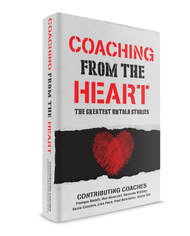
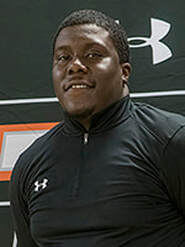
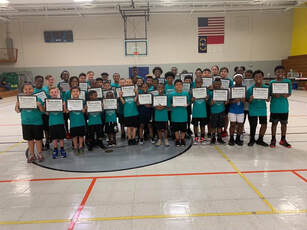
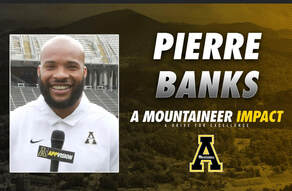
 RSS Feed
RSS Feed